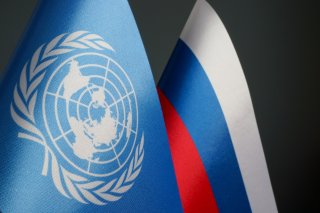Russia’s UN Security Council Presidency: A Reward for Its War Crimes?
The brazen paradox of an international aggressor presiding over an institution of peace underscores the absurdity of Russia’s UNSC presidency.
In a gruesome display of brutality, Russian soldiers recorded themselves beheading a defenseless Ukrainian soldier, sparking outrage and condemnation. The footage surfaces while Russia holds the United Nations Security Council (UNSC) presidency—much to the opposition of Ukraine and its allies. The brazen paradox of an international aggressor presiding over an institution of peace underscores the absurdity of Russia’s UNSC presidency.
The legitimacy of Russia’s UNSC seat has been questioned, in no small part due to the lack of formal approval from the UN General Assembly (UNGA). Russia’s succession of the USSR’s seat in the UNSC is not a result of an automatic operation of law, but rather the result of a political choice—whether logical or not. Despite having never been voted into UN membership by the UNGA, Russia was given the USSR seat in 1991. Article 4 of the UN Charter requires new members to be admitted through an UNGA vote; however, Russia sidestepped this stipulation by claiming to be the sole legitimate successor of the USSR’s UN membership. The tacit consent of Russia’s UNSC seat is now at the forefront of international debate. All successor states of former Czechoslovakia and Yugoslavia were obliged to be admitted by an UNGA resolution—only Russia was granted silent approval to proceed not according to precedent or law.
The United Nations is also discredited by the mockery that is Russia’s UNSC presidency. Russia at the helm of the UNSC has an internationally-sanctioned channel to disseminate propaganda which risks the UN becoming a mouthpiece. The UN’s credibility helps legitimize disinformation that Russia circulates through “narrative laundering,” whereby Russia cultivates proxies to spread disinformation to mainstream media. By clouding or legitimizing disinformation sources, Russia promotes fragments of false narratives, which aim to discredit Ukraine. Russia’s strategic communication strategies enable it to bring anti-Ukrainian propaganda to the Global South, particularly to Africa and Latin America, to shape public opinion favorably. Such actions undermine the UN and erode trust in its legitimacy.
This is not the first time that the UN is unable to address Russia’s defiance of international law. In 2009, following Russia’s invasion of South Ossetia, Russia vetoed the extension of the UN observer mission in Georgia. This shifted international attention from the invasion and set Russia on a path of continued impunity. Following the 2014 annexation of Crimea, Russia’s UNSC presence ensured that neither a resolution reaffirming Ukraine’s territorial integrity nor action reversing the annexation could be taken. When the Syrian Government used chemical weapons against civilians in 2018, Russia vetoed proposals for a meaningful response to the war crimes to keep President Bashar al-Assad in power. These examples reinforce the continuity of Russian harm to the UN’s mission and illustrate the imperative of UNSC reform. They also highlight institutional risks arising from Russian veto rights in the context of the Ukraine war. If unreformed, the UN’s fate might resemble that of the League of Nations, which failed to prevent World War II due to non-reaction to Germany’s 1939 invasion of Poland.
To reform the UNSC, the UN Charter needs to be amended—amendments require ratification from two-thirds of UNGA members including all permanent UNSC members. Past reform attempts have been an uphill battle; however, there are short-term tools to address Russia’s repeated disregard of the institution’s mission.
First, investigations into the transfer process of the USSR’s permanent seat to Russia should be launched. These investigations operate on the assumption that Belarus and Ukraine, as founding UN members, had an equally justified claim to the seat—a characteristic no other original members share. Second, Belarus should be disqualified from the permanent seat due to complicity in Russia’s invasion of Ukraine. Third, rules on procedural matters should be invoked and a vote on replacing Russian UNSC representatives initiated. This decision requires a nine-member UNSC majority and cannot be vetoed by permanent members. By referencing Russia’s violations of the UN Charter through its disrespect of Ukrainian sovereignty, these tools can counter Russian disinformation and restore institutional credibility.
Long-term reforms should not be off the table. At a minimum, reforms should allow for temporary suspension of a member’s presidency. The basis for suspension could be an UNSC simple majority vote declaring a member temporarily unfit to fulfill the presiding role. This vote should be held based on a set of criteria, including the invasion of another country. The basis could also be UNGA support of suspension exemplified by resolutions against a UNSC member’s conduct.
Almost eighty years after World War II, the UN faces a similar fate as the League of Nations when it failed to prevent the largest catastrophe of the century. If the UN fails to take meaningful action against Russia, it could spell the end of the institution’s legitimacy and encourage similar future UN Charter violations. The international community must address Russian recklessness, lest Russia escalates its war crimes and hijacking of the international order.
Svenja Kirsch is a Fellow at Harvard Kennedy School’s Belfer Center. She is affiliated with the Project on Europe and the Transatlantic Relationship. She works on the future of European security amid the war in Ukraine and specializes on the future role of NATO and the EU, cyberwarfare, and Europe’s role in great power competition.
Vladyslav Wallace is a Ukrainian-American Belfer Young Leader Student Fellow at the Harvard Kennedy School and a Thomas R. Pickering Graduate Fellow at the U.S. Department of State. He works on U.S. diplomacy and foreign policy and specializes in matters related to Eurasia such as human rights and democracy.
Image: Vitalii Vodolazskyi / Shutterstock.com

